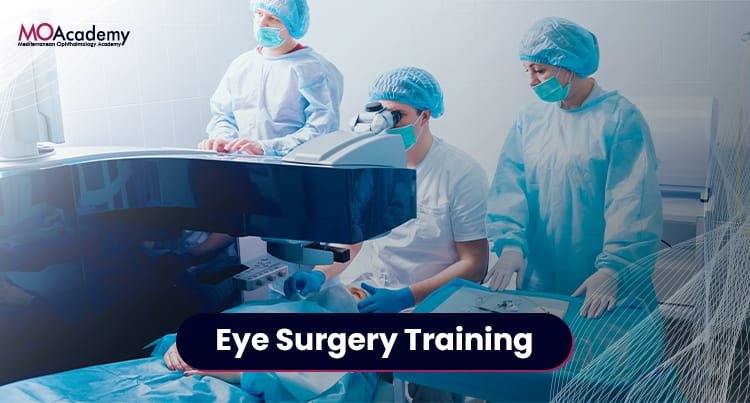Your Ultimate Guide to the Eye Surgery Training
Eye Surgery Training
Eye surgeries are simply a wide range of procedures that are done
and sometimes customized as per the medical condition.
For Ophthalmologists and eye surgeons to be trained on the most advanced
techniques and acquainted with all the complex cases and rare conditions,
the eye surgery training takes place to ensure that surgeons are properly
equipped with all the knowledge and practical practices.
The eye surgery training is offered for residents, fellows,
and practicing ophthalmologists who are planning to specialize
further in the optic field.
There are many types of eye surgeon training that ensure covering
all the kinds of specialization and eye conditions.
Buckle up as Mo Academy is taking you on a journey to know not just the different
kinds of eye surgery training but also who are eligible for these eye surgery training.
Since Cataract is becoming a very common condition,
Mo Academy is presenting a full take on it as well as the most advanced
means to apply its surgery.
Check Cataract Surgery Steps, extracapsular cataract extraction,
femtosecond laser cataract surgery, small incision cataract surgery,
and Laser Treatment for Cataracts.
What Does Basic Ophthalmic Surgery Training Cover?
This eye surgery training focuses on equipping its residents with the foundational surgical skills.
These skills include but are not limited to the Cataract surgery,
which is also known as Phacoemulsification.
This means that surgeons get trained on the Cataract removal utilizing
the most recent techniques which is the Phacoemulsification; this means
that they learn how to break the clouding cataract effect
as well as know the basic steps of inserting an IOL,
which stands for intraocular lens.
Closer Look at Phacoemulsification
In order to have a closer glimpse of what Phacoemulsification is,
check phacoemulsification training, Phaco training,
phacoemulsification training course, two weeks phaco training,
short term phaco training, phacoemulsification course,
phacoemulsification fellowship, and Phaco Training Courses.
Also, the basic training trains ophthalmologists on performing LASIK as well as
Photorefractive Keratectomy in order to correct any refractive errors in one’s eyes.
Moreover, this training ensures that surgeons practice managing eye injuries,
including foreign body removal.
What Is the Difference between Retinal Surgery Training and Glaucoma Surgery Training?
The retinal surgery training is usually enrolled into by medical residents
who are interested in pursuing a career in the retina subspecialty.
This procedure is essential for maintaining the vision
of the eye in some conditions like Vitrectomy;
this procedure implies the removal of the vitreous
gel from the eye to access the retina.
This applied to the different types of retina diseases.
In some cases the retina issue can be handled through laser intervention,
which is known as Laser photocoagulation,
and the trainees get trained on that as well.
Lastly, the retinal detachment surgery.
For this type of surgery, ophthalmologists get trained on techniques to repair
a detached retina like scleral buckling or pneumatic retinopexy.
With Mo Academy, you can know all you need about retina and vitreous surgery,
surgical retina fellowship, vitreoretinal surgery procedure, vitreous retinal surgery,
Medical Retina Training, and Medical Retina Online Course.
On the other hand, the Glaucoma surgery training targets medical figures
who are willing to pursue a career in the subspecialty of glaucoma.
Through this surgery training, they get trained on the different surgical
techniques to treat a Glaucoma.
This includes practicing the Trabeculectomy,
which is done for the sake of lowering the
intraocular pressure through creating a hole in the eye
to create an exit that reduces the pressure.
When trabeculectomy is not suitable, surgeons resort to a surgical
solution known as Tube shunt surgery in order to drain
excess fluid from the eye.
Also, enrollers in this surgical training are introduced to this practice.
Lastly, the surgeons get acquainted with less invasive
techniques such as micro stents and laser procedures
to cure the Glaucoma and lower the consequential risks.
Who Are Eligible for an Eye Surgery Training:
Medical Graduates:
In order to participate in an eye surgery training,
candidates must have completed a medical degree.
They have to be qualified as doctors first.
This is the initial step in order to apply for an ophthalmology residency program,
in which they will be introduced to basic surgical training.
Ophthalmology Residents
Medical school graduates who have been accepted into an ophthalmology
residency program are eligible for the eye surgery training.
Through these training they get familiarized with general ophthalmic training.
They get the needed guidance in performing various surgical procedures
under the mentorship of optic professionals.
Experienced Ophthalmologists Pursuing Specialization
Ophthalmologists who are already practicing but wish to pursue a certain
specialization are also eligible to be part of an eye surgery training
that familiarizes and equips them with the needed surgical knowledge
and techniques regarding certain specialization or subspecialty.
Conclusion:
The eye surgery training aims at providing the needed surgical guidance
for its fellows in order to gain the needed knowledge and set their steady
footsteps within certain optic specialization.
Therefore, the different types of eye surgery training needs to be tackled
in order for ophthalmologists to know which ones they need to strengthen
their surgical knowledge and which optic area they would like to specialize in.
Additionally, there is a certain eligibility criteria that has been tackled
within the lines above to clarify that the eye surgery training
is not just for anyone interested in eye health, but it is for those who have been
certified and ready to pursue more.
The field of Ophthalmology is a fast paced field and an ever evolving
one in its depth and richness; therefore, it is normal to have many questions
that you would like to get answered.
Therefore, Mo Academy’s team is ready to assist. You can always Contact us.

